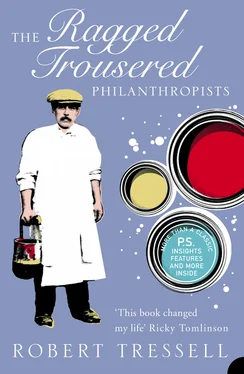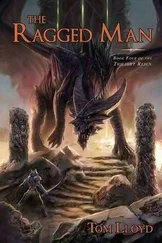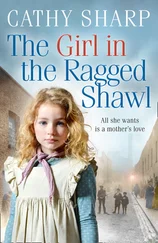Harper Perennial Modern Classics
The Ragged Trousered Philanthropists
Robert Tressell

Cover Page
Title Page Harper Perennial Modern Classics
PUBLISHER’S NOTE PUBLISHER’S NOTE Robert Tressell’s original MS was ‘edited’ and ‘re-edited’ at various times. This complete edition presents the work in almost its original form (it has been necessary to retain some editorial paraphrases where the original text is lost beyond trace: such paraphrases are enclosed within square brackets). Tressell’s idiosyncratic grammar, spelling and punctuation (his way of conveying the spoken idiom of his characters), as well as his somewhat inconsistent use of capital letters, has been restored.
Introduction
Introduction
Preface
1 An Imperial Banquet. A Philosophical Discussion. The Mysterious Stranger. Britons Never shall be Slaves
2 Nimrod: a Mighty Hunter before the Lord
3 The Financiers
4 The Placard
5 The Clock-case
6 It is not My Crime
7 The Exterminating Machines
8 The Cap on the Stairs
9 Who is to Pay?
10 The Long Hill
11 Hands and Brains
12 The Letting of the Room
13 Penal Servitude and Death
14 Three Children. The Wages of Intelligence
15 The Undeserving Persons and the Upper and Nether Millstones
16 True Freedom
17 The Rev. John Starr
18 The Lodger
19 The Filling of the Tank
20 The Forty Thieves. The Battle: Brigands versus Bandits
21 The Reign of Terror. The Great Money Trick
22 The Phrenologist
23 The ‘Open-air’
24 Ruth
25 The Oblong
26 The Slaughter
27 The March of the Imperialists
28 The Week before Christmas
29 The Pandorama
30 The Brigands hold a Council of War
31 The Deserter
32 The Veteran
33 The Soldier’s Children
34 The Beginning of the End
35 Facing the ‘Problem’
36 The OBS
37 A Brilliant Epigram
38 The Brigands’ Cave
39 The Brigands at Work
40 Vive la System!
41 The Easter Offering. The Beano Meeting
42 June
43 The Good Old Summer-time
44 The Beano
45 The Great Oration
46 The ‘Sixty-five’
47 The Ghouls
48 The Wise men of the East
49 The Undesired
50 Sundered
51 The Widow’s Son
52 ‘It’s a Far, Far Better Thing that I do, than I have Ever Done’
53 Barrington Finds a Situation
54 The End
Appendix Mugsborough
Select Bibliography
P.S.
About the author
Life and Times: A Chronology
Did You Know?
About the book
How The Ragged Trousered Philanthropists Changed My Life
The Book’s Reception
What the Papers Said
Conclusions
The Full Monty: Recovering Tressell’s Manuscript
Adaptations
Read on
Websites
Recommended Criticism and Biography
About the Author
Copyright
About the Publisher
Robert Tressell’s original MS was ‘edited’ and ‘re-edited’ at various times. This complete edition presents the work in almost its original form (it has been necessary to retain some editorial paraphrases where the original text is lost beyond trace: such paraphrases are enclosed within square brackets). Tressell’s idiosyncratic grammar, spelling and punctuation (his way of conveying the spoken idiom of his characters), as well as his somewhat inconsistent use of capital letters, has been restored.
This novel is about a group of painters and decorators, and their families, in Hastings (Mugsborough), around 1906. It describes the workman’s life of that time, the subjection, deception, and destitution of the people whose labour helped to create the luxury and glitter of the Edwardian age. It is the age which those who didn’t have to live in still like to refer to as the good old days of pomp and circumstance, the apex of England’s greatness, the time before 1914 when everyone knew his place and because of it was supposed to be contented.
I read an abridged edition of The Ragged Trousered Philanthropists when I was nineteen and with the Air Force in Malaya. It was given to me by a wireless operator from Glasgow, who said: ‘You ought to read this. Among other things it is the book that won the ‘45 election for Labour.’ It had been cut to half the length of the present full version, made to end on a note of despair suggesting that cranks who believed in Socialism could do nothing better than think of suicide. The present edition ends the way the author intended.
It isn’t easy to say precisely the effect this book had on me when I first read it. It certainly had a great one, because it has haunted me ever since. Those whose life has touched the misery recounted by Robert Tressell can get out of it many things: a bolstering of class feeling; pure rage; reinforcement for their own self-pity; a call to action; maybe a good and beneficial dose of all these things.
Owen, the main character, tries with marvellous patience and tenacity to enlighten his workmates, to tell them how Socialism could level out riches and give them not only a little more to live on, but also real hope of alleviating their inequalities for good. They won’t listen, so he calls them philanthropists, benefactors in ragged trousers who willingly hand over the results of their labour to the employers and the rich. They think it the natural order of things that the rich should exploit them, that ‘gentlemen’ are the only people with a right to govern. This theme is the soul of the novel, yet a mass of personal detail keeps it a novel and not a tract.
Robert Tressell (born Robert Noonan) was himself one of the workmen he describes, wrote his book in his spare time, and knew exactly what he was talking about. He died of tuberculosis in 1911, when he was forty, and his book was not published until 1914. It has gone through many varied editions since then, and has sold tens of thousands of copies all over the world. But this is the first time that the full edition has been published in paperback form.
Strange to say, one of my first thoughts after finishing the abridged edition was: ‘This book hasn’t been written by a working man’ – thereby displaying those symptoms of faithlessness that so outraged Owen. Fifteen years later, reading Tressell of Mugsborough , by F.C. Ball, I found the following sentence from a letter writen by a relation of Tressell’s: ‘I have told you quite truthfully that Robert was not born into the working class. He would have had a very much happier life, no doubt, had he been.’
It is useless to argue about what ‘class’ a man was born into, but it is interesting to know that Tressell was a person grafted on to working-class life through family misfortune. Little is known about his early years, but one account says that his father was an Inspector in the Royal Irish Constabulary.
Of great talent and outstanding passion, Tressell grieved for the people around him, for their poverty as well as his own. Add to that his Irish descent and a justifiable detestation of the English middle and upper classes; and also the fact that he was a sick man most of his life, and you have the author of what has become an English classic.
This was the first good novel of English working-class life. A generation before it, appeared those of Arthur Morrison, who wrote A Child of the Jago , and Tales of Mean Streets. Morrison’s writing, however, was as slick as the Sunday newspapers, and his pompous and passionless style either lulls you to sleep or makes you distrust it. He wrote from too far above his characters: they lived in a zoo, and were to be regarded with fear, hostility, and derision. His working man was the stereotype (add a dose of dirt for realism) that still plagues English fiction. Robert Tressell, on the other hand, put his ordinary people into correct perspective by relating them to society as a whole.
Читать дальше













